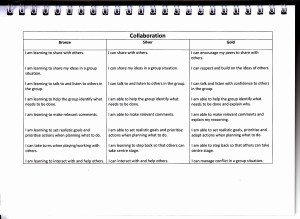Here at Building Learning Power towers we have long been firmly of the belief that learning is learnable – to oversimplify, one aspect of Learning Power is an extension of Carol Dweck’s outstanding and well-accepted work on growth mindsets. But after you have accepted that the mind is a balloon, capable of expansion and lift, rather than a bucket of finite capacity….what next? Is instilling children with a belief that ‘you can do it’ simply enough? Surely not, for the question which arises is ‘How?’. Moreover, once you have identified ‘how’, the next question is ‘How can I get better?’. This is where our work on progression in learning capacities picks up.
I was working with a primary school recently who have developed their own ‘progression maps’ for learning capacities – they call it their Growth Curriculum. For each of the 17 Building Learning Power learning capacities, the school has identified the fine-grain learning behaviours/skills that progressively build up over time to form the effective imaginer, listener, noticer, collaborator etc. (“17?!” I hear new readers cry. Yes, 17, but never introduced all at once! Stick with me here.) These behaviours/skills are grouped into bronze (broadly for KS1), Silver (lower KS2) and Gold (upper KS2).
What is most interesting is the ways in which the school uses the maps. Each child has their own bound copy of all 17 maps which they use to:
- Understand better the nature of the 17 capacities
- Identify the skills in which they are already secure
- Agree which ones they might need to work on next
- Decide which skills will be required for an upcoming task
- Reflect on the behaviours they employed to solve a problem.
As a result, the pupils understand themselves as learners and know how they need to develop in order to become an increasingly effective learner. They are able to talk about the capacities, like Imagining, with precision and evident understanding.
The Ofsted Common Inspection Framework (2015) now requires inspectors to make a judgement on the extent to which the provision is successfully promoting and supporting children’s ‘self-confidence, self-awareness and understanding of how to be a successful learner’. The pupils at this primary school are well-placed to provide outstanding evidence of how this is being achieved.
If your interest has been piqued, our online Stepping Stones programme, Establishing Key Learning Behaviours, will help you to introduce, embed, and grow the learning capacities in your school. Take a look here for more detail.
The new Demos paper has some interesting things to say about character in education. Read the full paper here.


Comments are closed.